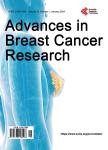Increased Cellular Invasion and Proliferation via Estrogen Receptor after 17-<i>β</i>-Estradiol Treatment in Breast Cancer Cells Using Stable Isotopic Labeling with Amino Acids in Cell Culture (SILAC)
Increased Cellular Invasion and Proliferation via Estrogen Receptor after 17-<i>β</i>-Estradiol Treatment in Breast Cancer Cells Using Stable Isotopic Labeling with Amino Acids in Cell Culture (SILAC)作者机构:American Association of Cancer Research Philadelphia USA Department of Biomedical Engineering Drexel University Philadelphia USA Department of Cancer Biology Kimmel Cancer Center Thomas Jefferson University Philadelphia USA
出 版 物:《Advances in Breast Cancer Research》 (乳腺癌(英文))
年 卷 期:2013年第2卷第2期
页 面:32-43页
学科分类:1002[医学-临床医学] 100214[医学-肿瘤学] 10[医学]
主 题:17-β-Estradiol Breast Cancer Estrogen Receptor Mass Spectrometry SILAC
摘 要:17-β-estradiol (estrogen) is a steroid hormone important to human development;however, high levels of this molecule are associated with increased risk of breast cancer primarily due to estrogen’s ability to bind and activate the estrogen receptor (ER) and initiate gene transcription. Currently, estrogen mechanisms of action are classified as genomic and non-genomic and occur in an ER-dependent and ER-independent manner. In this study, we examine estrogen signaling pathways, by measuring changes in protein expression as a function of time of exposure to estrogen in both ER-positive (MCF-7) and ER-negative (MDA-MB-231) cell lines. Using a robust experimental design utilizing isotopic labeling, two-dimensional LC-MS, and bioinformatics analysis, we report genomic and non-genomic ER regulated estrogen responsive proteins. We find a little over 200 proteins differentially expressed after estrogen treatment. Cell proliferation, transcription, actin filament capping and cell to cell signaling are significantly enriched in the MCF-7 cell line alone. Translational elongation and proteolysis are enriched in both cell lines. Subsets of the proteins presented in this study are for the first time directly associated with estrogen signaling in mammary carcinoma cells. We find that estrogen affected the expression of proteins involved in numerous processes that are related to tumorigenesis such as increased cellular division and invasion in an ER-dependent manner. Moreover, we identified negative regulation of apoptosis as a non-genomic process of estrogen. This study complements gene expression studies and highlights the need for both genomic and proteomic analyses in unraveling the complex mechanisms by which estrogen affects progression of breast cancer.



